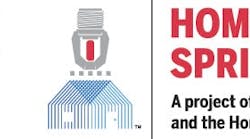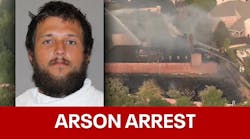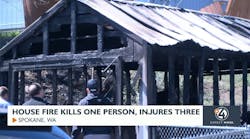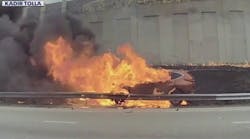Smoked salmon and smoked brisket are delicious, but somehow smoked wine sounds far less appetizing.
But inadvertently, wine can develop an unpleasant smoky smell or ashy aftertaste when vineyards are flooded with smoke from nearby wildfires.
This summer, Washington State University scientists launched a new study to purposefully smoke grape vines to assess how much exposure is needed to cause “smoke taint” and how the wine-making process can be adjusted to minimize the effects of those flavors.
“Everyone would like to know if there is a wildfire nearby, or not so nearby, but if there is smoke in the vineyard and if the fruit has been exposed to a certain amount of smoke, could they have a problem or not?” said Tom Collins, Washington State University Tri-Cities assistant professor of viticulture and enology.
Collins, who recently moved to WSU from California, said he’s seen smoke ruin the taste of wines in California after bad fire seasons, but the impacts are hard to predict because of all the variables — amount of exposure, stage of fruit development, and wine making choices to name a few — that presumably play a role.
His research — using a backyard smoker in greenhouses of cabernet and riesling vines — is designed to sort out many of those factors.
Smoke taint has also been a concern in Washington, said Vicky Scharlau, director of the Washington Association of Wine Grape Growers. But, she stressed that impacts are rarely widespread and in some cases, there might be more worry than is warranted.
“Every fire is different and every winery is different, and there’s so much we don’t know,” Scharlau said.
She praised Collins’ research plans for hopefully providing the wine industry with answers.
Scientists already understand that the smoky flavor is produced when smoke particles bind with sugar molecules in the ripening fruit, Collins said.
These bound compounds — called glycosides — don’t smell smoky at first, but they are broken down by enzymes in your mouth, which releases the smoke into a free form which we can taste, he said. That can make it hard for wine makers to assess if a wine has been affected right away.
“We’ll be making wine from the fruit we smoked so we can look at the practice for extracting these compounds from the fruit into the wine,” Collins said.
That information should help wine makers minimize impacts, Collins said. For example, the compounds of concern are often found in the skins, so wine makers may want to ferment the grapes with their skins for less time than usual if they are worried about smoke taint.
For white wines, which are usually not fermented with skins, smoke may also be less of an issue.
Most of the previous research on smoked wine has focused on short bursts of heavy smoke exposure. Collins said he wants to mimic prolonged, less intense exposure, such as many Washington vineyards might have experienced last summer as wildfires raged across the state.
He also plans to experiment with exposure during different stages of fruit development.
During the 2014 wildfire season, Great Northwest Wine reported that few industry experts were worried about smoke taint because they said it rarely has a significant impact in Washington, despite some very smoky summers.
But without more detailed information about the risks, some growers and wine makers still worry when there is a fire nearby.
Marcus Miller, the wine maker at Airfield Estates in Prosser, said he was pretty concerned the night the Range 12 Fire was roaring across miles and miles of desert grassland to the north of his vineyards. But the air cleared quickly so he thinks his grapes are fine.
“If I don’t smell it, I figure I’m OK,” Miller said in an email. “Some winemakers have told me it is really bad when you get ash in your vineyard and it sits in the canopy.”
Collins hopes his research can provide more definitive answers for the region’s wineries so they can know more about living with wildfires.
———
©2016 Yakima Herald-Republic (Yakima, Wash.)
Visit Yakima Herald-Republic (Yakima, Wash.) at www.yakima-herald.com
Distributed by Tribune Content Agency, LLC.





